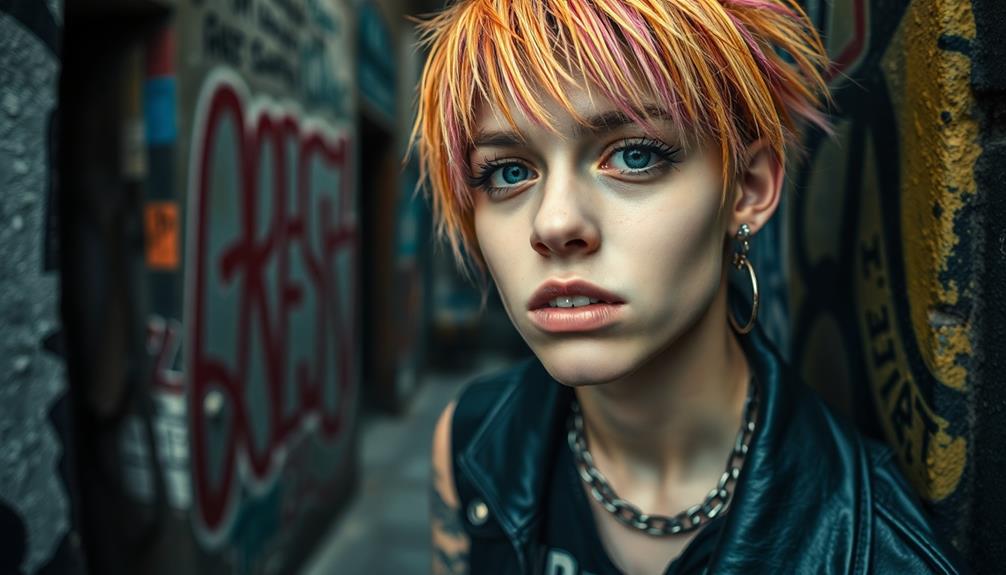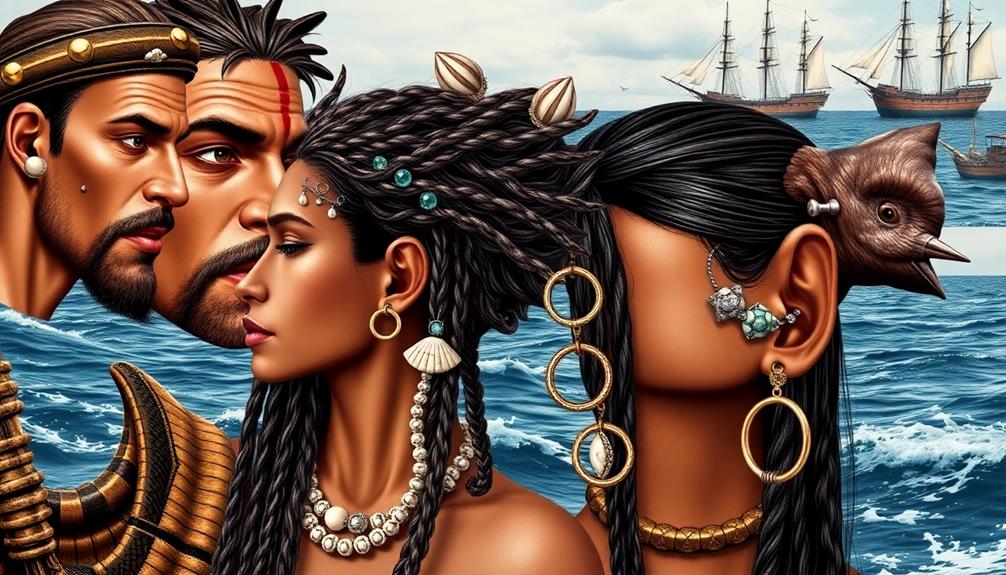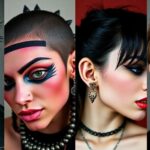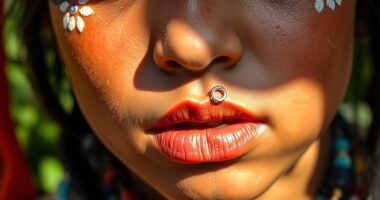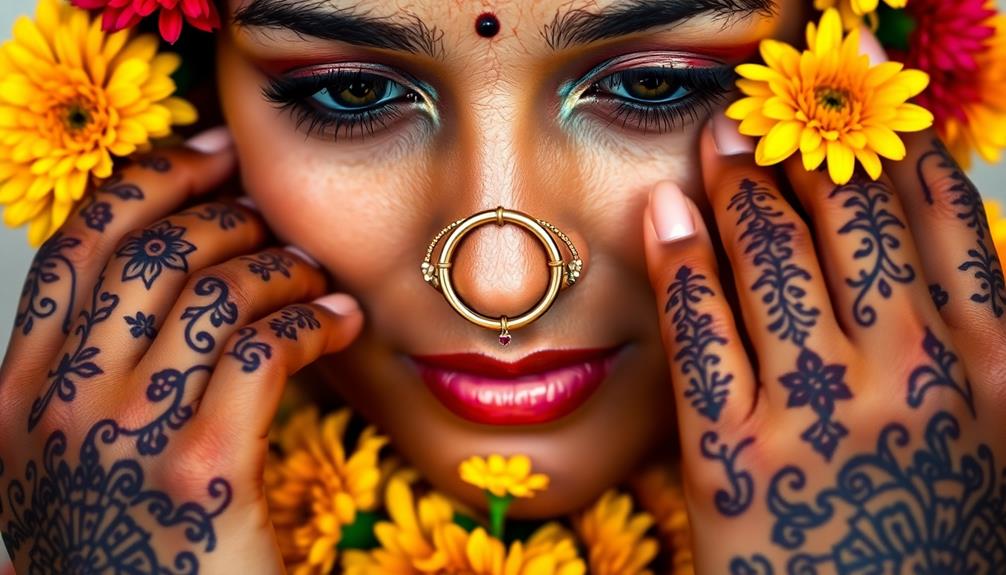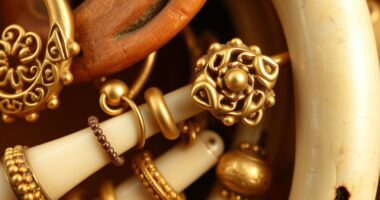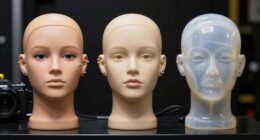Body piercings in the punk movement aren't just fashion choices; they're powerful symbols of rebellion. Emerging in the 1970s, punks like Sid Vicious and Joan Jett showcased piercings to challenge societal beauty standards and express individuality. Each piercing tells a personal story, aligning you with nonconformity and authenticity. The DIY ethos in punk culture made it possible for many to embrace unique styles and reject mainstream norms. Today, those edgy piercings continue to inspire a sense of community and self-expression. If you're curious about how these symbols have evolved, there's much more to uncover.
Key Takeaways
- Body piercings emerged in the 1970s punk movement as symbols of rebellion and self-expression against mainstream beauty standards.
- Iconic punk figures like Sid Vicious and Joan Jett popularized multiple piercings, reinforcing their defiance of societal norms.
- The DIY ethos within punk culture promotes at-home piercings and support for underground studios, emphasizing individuality and authenticity.
- Punk's influence has led to mainstream acceptance of piercings, transforming them into fashionable expressions of personal identity.
- Health and safety considerations, including choosing reputable studios and proper aftercare, are essential for safe body modification experiences.
Historical Context of Punk Piercings
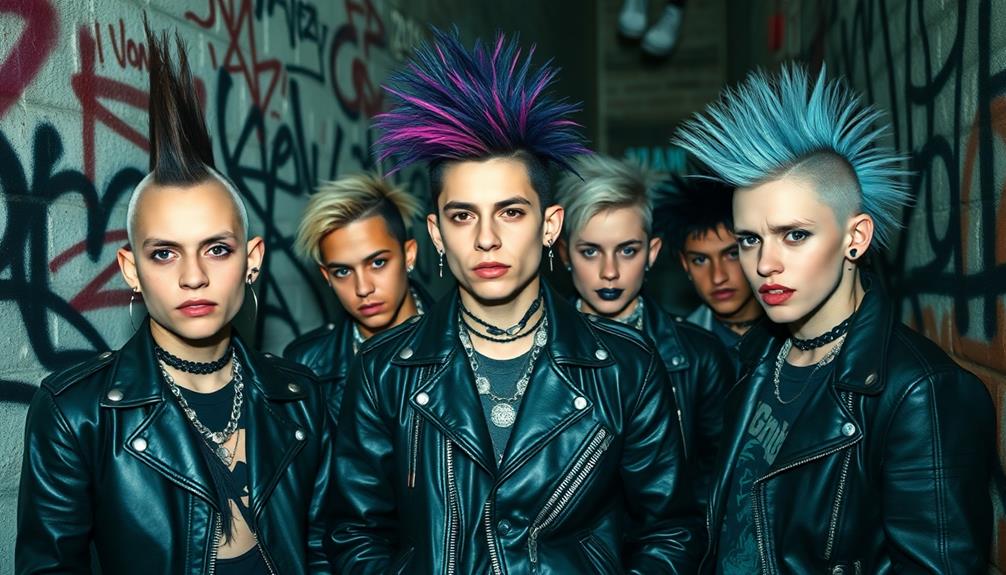
The punk movement, which burst onto the scene in the 1970s, embraced body piercings as a bold act of rebellion against mainstream culture. This counterculture aimed to disrupt societal norms, and body piercings became a powerful symbol of self-expression. Punk icons like Sid Vicious and Joan Jett popularized multiple piercings, using them to assert their individuality and challenge traditional beauty standards.
The opening of the first piercing studio in West Hollywood in 1978 marked a significant change. Body piercings evolved from a marginal practice to a defining feature of punk identity. Punk culture often featured styles like septum, eyebrow, and lip piercings, which served as visual declarations of defiance. Each piercing became a badge of honor within the community, reinforcing bonds among punks who shared a disdain for conformity.
The DIY ethos prevalent in the punk movement encouraged individuals to explore unconventional piercings, further enhancing their self-expression. By embracing body piercings, punks not only challenged societal expectations but also created a sense of belonging among like-minded rebels.
This historical context highlights how body piercings emerged as an essential aspect of the punk movement and a reflection of its enduring legacy.
Body Piercings as Rebellion

Body piercings emerged as a bold statement of rebellion within the punk movement, allowing individuals to challenge societal norms directly. By adopting body piercing as a form of self-expression, you align yourself with a culture that values nonconformity and authenticity.
Punk icons like Sid Vicious and Joan Jett popularized this defiant art, proving that piercings could signify more than just fashion—they became a visual marker of identity.
Here are three key aspects to evaluate:
- Challenging Beauty Standards: Punk piercings, such as septum and eyebrow styles, defied conventional beauty norms, encouraging individuality.
- DIY Ethos: The punk culture's do-it-yourself approach extended to body piercings, with many opting for at-home piercings or supporting underground studios, reinforcing anti-establishment sentiments.
- Cultural Shift: As punk rock gained visibility, society's acceptance of body piercings evolved, transforming them from shocking acts of rebellion into fashionable statements.
Through body piercing, you not only express personal identity but also participate in a broader movement that challenges and reshapes societal norms.
Iconic Punk Figures and Their Piercings
Within the punk movement, iconic figures like Sid Vicious and Joan Jett used piercings as powerful expressions of their defiance and individuality.
Sid Vicious, for instance, sported multiple facial piercings, including a striking safety pin through his nose, which became a defining symbol of the punk aesthetic. His bold choices embodied rebellion against mainstream norms and showcased the punk culture's embrace of body modification.
Joan Jett, equally influential, highlighted her piercings during performances, reinforcing the connection between body modification and punk identity. Through her eyebrow and lip piercings, she portrayed a fierce sense of self-expression that resonated with fans.
Both Sid and Joan exemplified how piercings served as a form of defiance, making a statement that extended beyond music into the very fabric of punk culture.
This emphasis on nonconformity led many punk musicians and fans to adopt varied styles of facial piercings, including septum piercings.
Their collective rebellion against societal expectations sparked widespread acceptance of body piercings, marking an essential aspect of punk culture and its enduring influence on self-expression.
Cultural Impact on Modern Trends

Punk's influence on modern fashion trends is undeniable, especially regarding body piercings. Originating in the 1970s, the punk movement embraced piercings as a bold form of self-expression that challenged societal norms.
Today, you see this legacy reflected in various aspects of fashion and culture, as individuals increasingly adopt a growth mindset toward their personal style.
Here are three key impacts of punk-inspired body piercings on modern trends:
- Mainstream Acceptance: What was once a symbol of rebellion has become a staple in mainstream fashion. Celebrities and influencers flaunt piercings, making them more socially acceptable.
- Diversity of Styles: The DIY ethos of punk culture encourages you to explore unique piercing styles. From septum rings to multiple ear piercings, individuality reigns supreme.
- Community Building: Body piercings foster a sense of community among those who appreciate alternative aesthetics. You're likely to find groups celebrating creative expressions, reinforcing the idea that body art transcends mere decoration.
As the punk movement evolved, its legacy of challenging conformity continues to inspire modern trends, encouraging everyone to embrace their unique identities through body piercings.
Symbolism in Punk Aesthetics
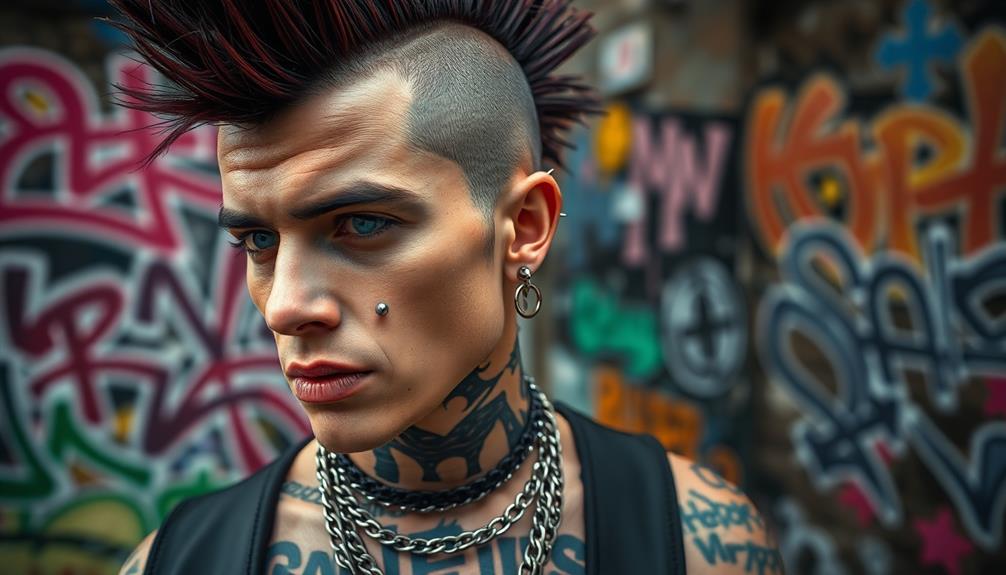
The symbolism behind body piercings in punk aesthetics runs deep, embodying a fierce rejection of mainstream norms and conventional beauty standards. Piercings often serve as a powerful form of body art, showcasing individuality and defiance. Icons like Sid Vicious and Joan Jett popularized multiple piercings, demonstrating how they could challenge traditional aesthetics.
Each piercing can carry significant meaning, representing personal stories and affiliations with subcultures that resonate with your identity. In the punk scene, piercings help create a sense of belonging among those who embrace nonconformity. They act as visual markers, uniting you with like-minded individuals who share similar values and rebellious spirits.
Social media has amplified this connection, allowing punks to showcase their unique styles and piercings to a broader audience. The visibility of these body modifications enhances the overall punk aesthetic, with styles ranging from eyebrow to septum piercings becoming emblematic of the movement.
Ultimately, body piercings in punk culture symbolize more than just rebellion; they reflect a commitment to personal expression and the celebration of diversity. Each piercing tells a story, making it an essential aspect of punk identity.
The Role of DIY Ethos
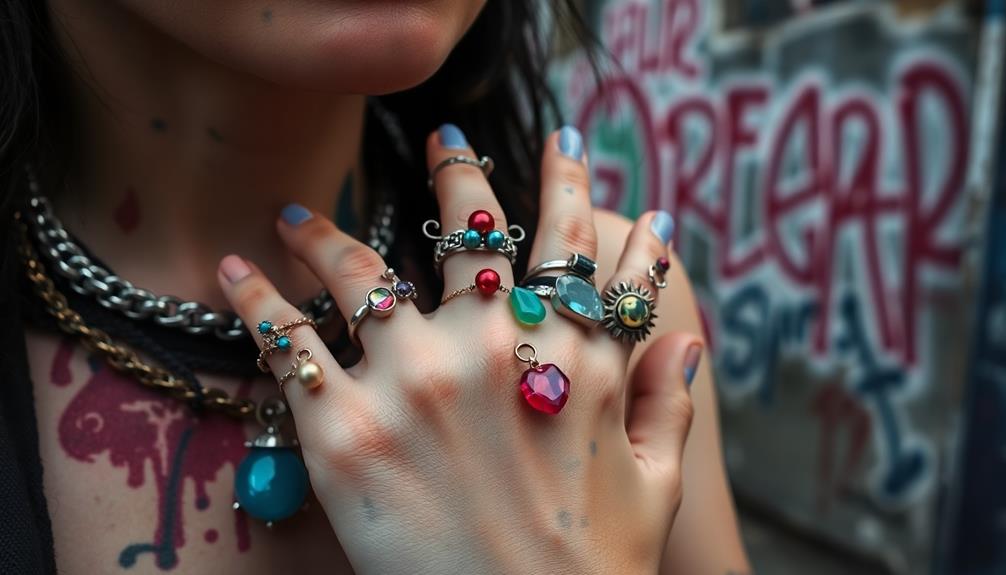
Body piercings in punk culture aren't just about rebellion; they also reflect a strong DIY ethos that empowers individuals to craft their unique identities. This hands-on approach emphasizes self-expression and authenticity, allowing punks to break free from mainstream fashion norms.
You'll find that the DIY ethos manifests in several key ways:
- Personal Modifications: Punk bands encourage fans to adopt multiple piercings as a way to express their individual identity, showcasing their defiance against societal conventions.
- Self-Taught Techniques: Many punks learn to pierce themselves or their friends, using makeshift tools and materials, which further embodies the movement's anti-establishment attitude.
- Cultural Acceptance: The DIY approach has helped destigmatize body piercings, making them a core aspect of the punk aesthetic and a badge of rebellion.
Health and Safety Considerations
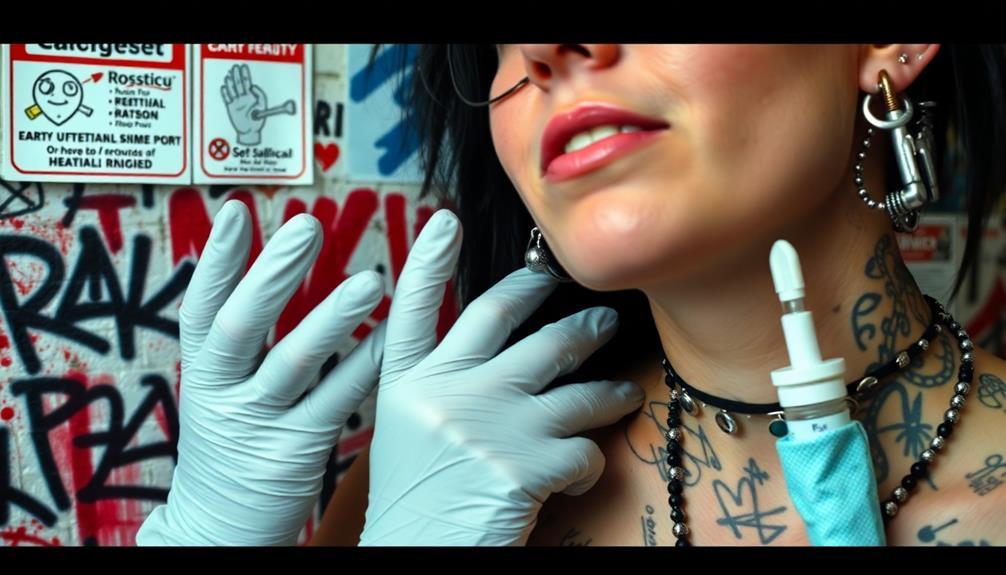
Maneuvering the world of body piercings requires careful consideration of health and safety to guarantee a positive experience. When you're getting pierced, choosing a reputable piercing studio with certified piercers is essential. This helps minimize the risks of infections and complications associated with body piercings.
Make certain the studio adheres to proper hygiene practices, like using sterilized equipment, to prevent allergic reactions and guarantee successful healing. Additionally, just as hydrocolloid technology is recommended for effective acne treatment, making sure your piercing studio follows strict sanitation protocols is critical for safe procedures.
Opting for high-quality materials, such as titanium or niobium, can greatly reduce the likelihood of body rejection and jewelry-related allergies. Once you've gotten your piercing, follow specific aftercare instructions closely. Each type of piercing has unique requirements, and improper care can lead to scarring and prolonged healing times.
Don't forget about regular check-ups with your professional piercer. These visits are essential for monitoring the health of your piercings and addressing any potential issues early on.
Future of Piercings in Punk Culture
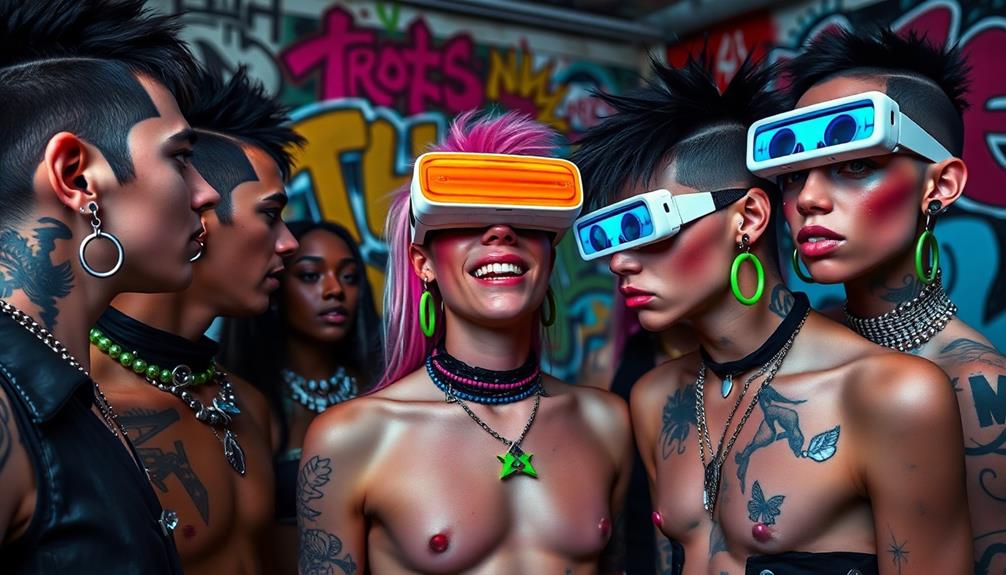
As health and safety considerations evolve, so does the landscape of body piercings in punk culture.
You'll find that piercings continue to thrive as a powerful form of self-expression and rebellion. The future looks bright for body art in this movement, especially with the influence of social media fueling new trends.
Here are three key aspects to watch for:
- Diverse Styles: Expect to see a rise in various piercings, including belly button piercings, septum piercing, and lip piercings. Each one serves as a statement of individuality and defiance against conventional beauty standards.
- Body Positivity: As the body positivity movement gains momentum, the stigma surrounding piercings is fading. This shift empowers individuals to embrace their unique aesthetics, making piercings more accepted and celebrated.
- Community Connection: Punk rock festivals and underground scenes will likely continue to highlight piercings as an essential part of personal style, reinforcing community ties and shared identity within the punk movement.
In this evolving landscape, body piercings remain a vibrant symbol of rebellion and self-expression in punk culture.
Frequently Asked Questions
Why Do Punks Get Piercings?
You get piercings to express yourself, challenge societal norms, and showcase your individuality. They become a visual representation of your beliefs, helping you connect with like-minded people who share your passion for nonconformity and self-expression.
What Is the Symbolism of Piercings?
Piercings symbolize individuality and self-expression. They reflect your personal journey, showcase your style, and challenge societal norms. Each piercing tells a story, marking your identity and connection to a community that values authenticity and uniqueness.
What Are the Symbols of the Punks?
Imagine sporting a bold anarchy tattoo while rocking a leather jacket. Punks embrace symbols like skulls, safety pins, and band logos. These represent defiance, individuality, and a fierce rejection of societal norms, making your statement clear.
What Is the Psychological Reason for Piercings?
When you get a piercing, it can empower you and boost your self-confidence. This act allows you to express your identity, and often brings a sense of belonging and emotional release within your chosen community.
Conclusion
To sum up, body piercings in the punk movement aren't just about aesthetics; they're a powerful symbol of rebellion and individuality. Some might argue that piercings are mainstream now, losing their original edge, but that's precisely the beauty of punk. It evolves while retaining its core spirit. Embracing piercings today can still challenge societal norms and express your unique identity. So, go ahead and wear your rebellion proudly—it's all part of the punk legacy!

